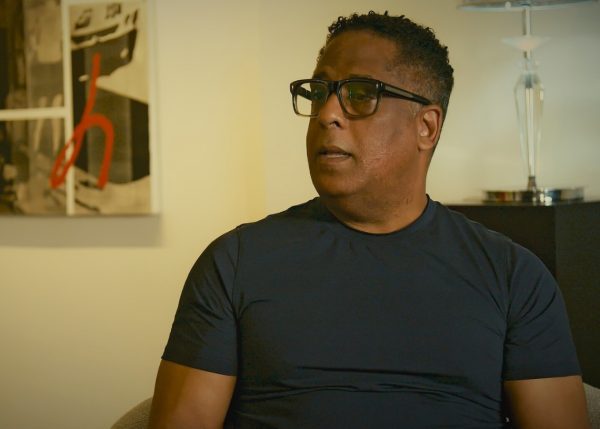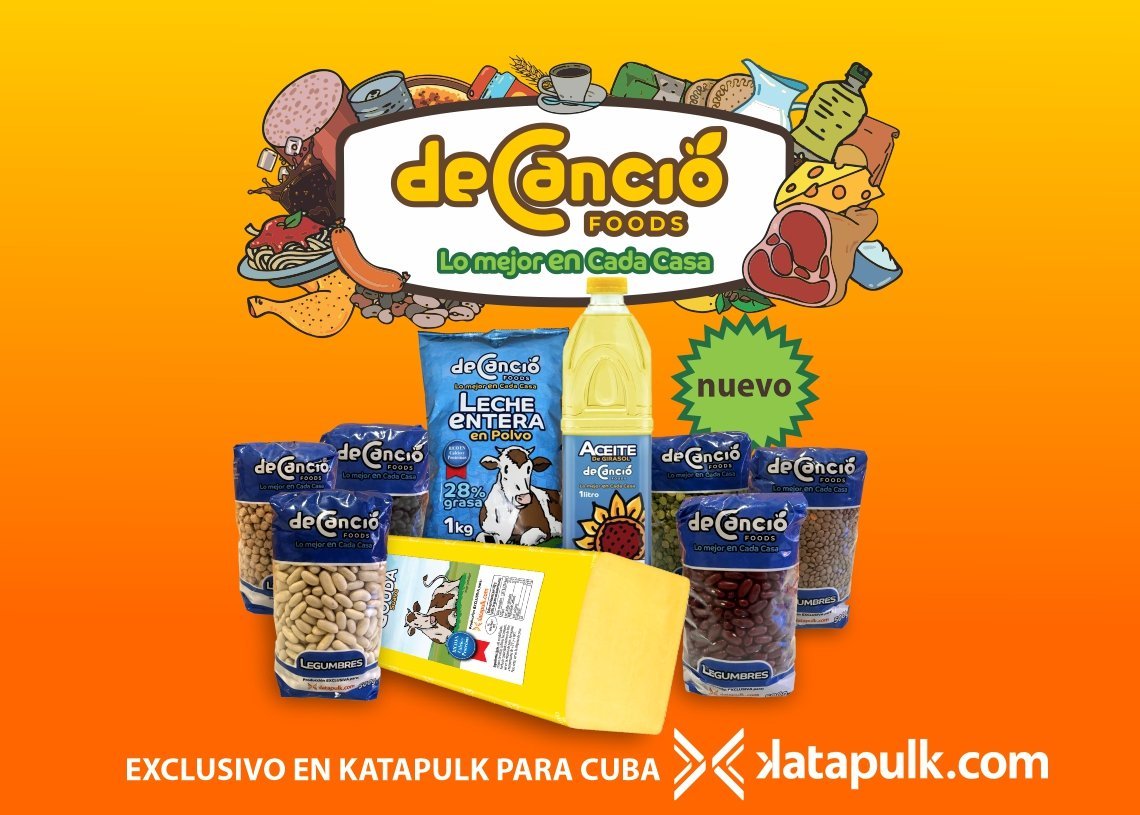We were able to meet in Havana. We were both waiting to attend — he as a guest, I as a journalist — the 4th The Nation and Emigration Conference that would finally be held on November 18 and 19, after more than two years of postponement due to the pandemic.
We decided to interview after the intense and busy days of the Havana International Trade Fair. We looked for two cameras, lights, microphones, a small support team between Havana, Miami and Madrid, and we sat down to talk in his apartment. I thanked him very much for granting OnCuba, our home, these two hours of conversation; a time that doubled, because on two occasions we had to stop the interview so that he could attend his scheduled work meetings. It was a long day.
Compared to the time of the “thaw” between Cuba and the United States, after D17 — days of optimism in which many media outlets, especially in his adopted country, sought to obtain his testimony — in recent years, Hugo Cancio has barely spoken with the press.
His distancing from the microphones, paradoxically, gave the “noise” around him the opportunity to multiply, in a context of very acute political polarization resulting from the profound comprehensive crisis that the island is experiencing.
Announcements that his company Katapulk has made in recent months; meetings or events in which he has participated in Cuba or the United States; the hands that he has shaken on some of those occasions…have motivated a great deal of “news,” often seasoned with tendentious inferences about his political position: for some, an unconditional ally of the Cuban government; for others, an agent of dismantling socialism in Cuba.
For now, the voice in the first person of our interviewee may be the best way to ward off those Manichean approaches. It allows adding nuances and a better understanding of the complexity of Cuba’s current times, beyond the biographical elements that appear in this long conversation with Hugo Cancio.
We deliver the interview to our audience in various formats: the trailer, the full video, the audio — for those who want to listen while driving on an expressway on their way home or while exercising at a fast pace along Havana’s Malecón.
Play to listen to the interview
Below you can read a summary organized by topic with highlighted excerpts from his answers to my questions.
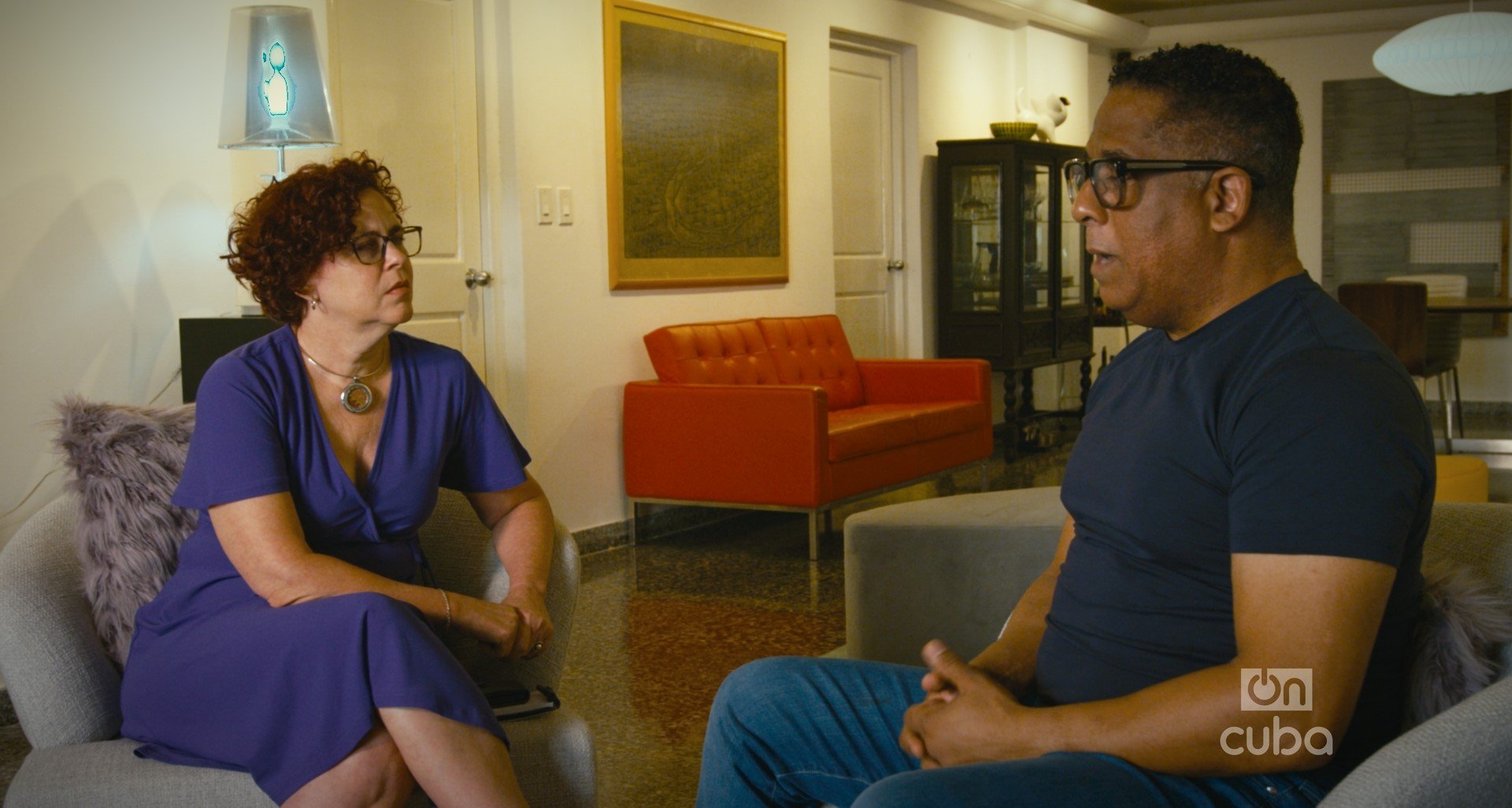
For more than 25 years
Hugo Cancio’s return to Cuba, after he departed from the country in 1980 during the Mariel exodus, began in the 1990s. In 1997 he became the producer of the movie Zafiros, locura azul — a gift he made his father, Miguel Cancio, one of the founders of the Los Zafiros quartet founded in 1962.
Zafiros, locura azul begins with one of my “silly” things — I told you about it before starting to record. In 1994 I had the opportunity to come to the first The Nation and Emigration Conference and a Cuban official asked me if I had had the opportunity to see the documentary Herido de Sombra, by Jorge Dalton, which had been shown on Cuban television and had been very popular and highly acclaimed. I said no. Enrique Román, the then president of the ICRT, sent me the VHS cassette of that documentary.
I was very excited, but my father did not receive it well. He considered that the documentary did not reflect the true nature, nobility and success that Los Zafiros had. It ended with a not very happy story where my uncle Kike [Leoncio Morúa], a founding member of the quartet who had died very young; Ignacio [Elejalde] too; my father had emigrated and only El Chino [Eduardo Elio Hernández Mora] remained in Cuba. El Chino was walking around his neighborhood in Cayo Hueso, an alcoholic, without any kind of help. He was subject to the admiration of the people in his neighborhood of Cayo Hueso but also criticism and ridicule.
My father was offended by that and I promised him that I’d return to Cuba to make a documentary that would show the other side of the coin. In a conversation with a friend from the Department of Cubans Living Abroad, I told him I wanted to make a “movie”; the word “movie” slipped out.
Now I don’t remember if it slipped me or if I exaggerated. The fact is that two hours later I found myself at the ICAIC talking with Alfredo Guevara, talking about making a feature film, a movie based on the story of Los Zafiros. And that silly thing, misuse of the word or exaggeration, led me to what became the movie Zafiros, locura azul.
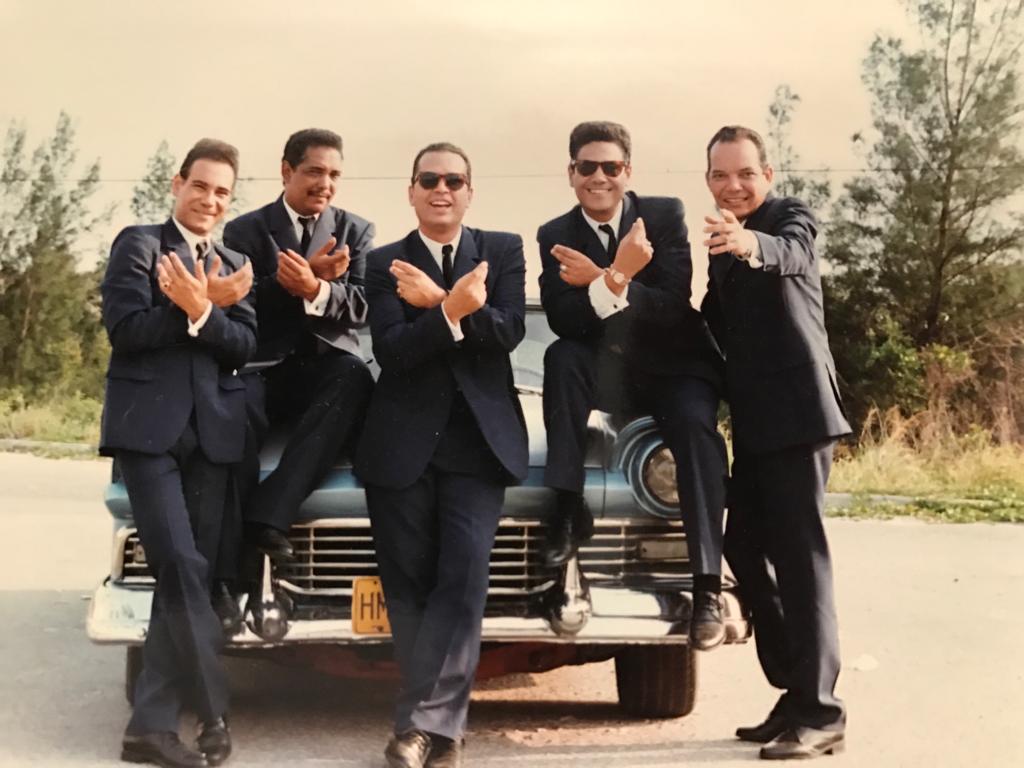
Reaction in Miami
Finally, I decided to present the film in a movie theater in downtown Miami and the tickets sold out within 24 hours. I decided to invite the entire cast of the film, the director, the actors, Cuban groups that were going to a jazz festival in Massachusetts. Until then, no Cuban artist had had a concert in Miami. It was a surprise. I lived in Miami and I knew that there was a sector of my community that opposed everything that had to do with the participation of the Cuban government. And even though none of us were members of the Cuban government, I never thought we would find a demonstration as large as the one outside the theater.
That is my first encounter with that sector of the community that carries genuine pain within them for the simple fact of having emigrated, or for not sharing the ideology of the country where they once resided. But sometimes they come out to demonstrate and exercise the right to criticize, and it was the first time I met that sector of my community. And that forced me to come out publicly, not to criticize it because I defended and still defend the right to public demonstrations, as long as they are done in an orderly manner and so on… I came out to defend my right to present my movie. And it hurt me a lot because I didn’t understand how a musical, cultural project, a non-politicized movie, that did not represent the Cuban government or its ideology, a movie that extended bridges of talks, understanding… was received like this.
To this day I sometimes have to go out and defend my right to do what I do, which does not conflict with anyone, but many people or some sectors of my community oppose it.
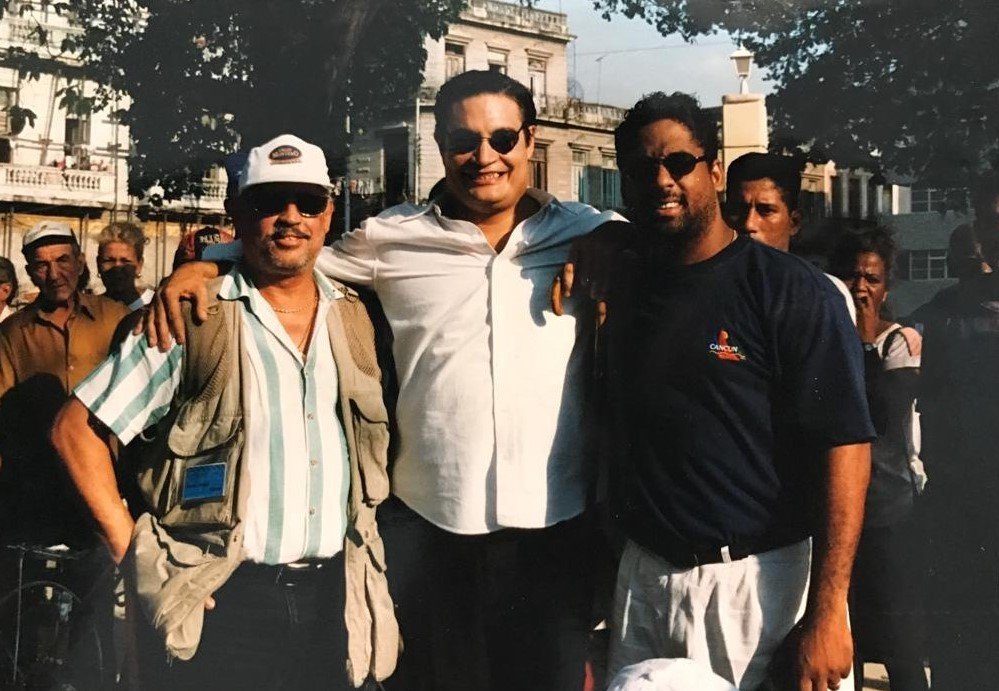
Music producer and promoter: music “made in Cuba” in Miami
In subsequent years, Hugo Cancio produced the first concerts and tours of Cuban musicians in the United States. At every moment he tried to contribute to the improvement of relations between both countries and explore business opportunities, at a time when very few Cuban-Americans were still looking for that type of rapprochement.
When I had the opportunity to live in Cuba and interact, exchange with the Cuban cultural world, it reminded me so much of my childhood and I began to ask myself: “How do I participate in this ecosystem of Cuban culture without being a musician, without having studied music and respecting the advice that my grandmother gave me?
And I found that I could do it from production, which brought me much closer to my roots, to what my father created.
I sat down with Isaac Delgado and we decided, we dared, to do in Miami the first Cuban music concert with a Cuban artist residing in Cuba. We did it and it was a success. And it was so nice. I remember presenting the concert. The images are there. We both thought we were going to fail because of the threats, the coercion, it couldn’t be promoted by any type of media.
The promotion was through flyers that we gave away and faxed. We would sit in an office with the yellow pages to send faxes. That was how we did the promotion. There was no way they would allow us to promote a concert where Cuban musicians participated. The invitations we received were for programs that we knew were going to bombard us in some way. We wouldn’t get out of there alive, to say the least.
I said: “For the first time we are going to present, we are going to have the opportunity to listen to Cuban music, made in Cuba. Directly from Havana, Cuba.” I presented the concert. After the success of that concert, I decided to do it for another year with other artists. The artists were Isaac Delgado, Manolín, Los Van Van, Orquesta Revé, National Folkloric Ballet of Cuba, Buena Fe, Paulo F.G. y su elite, Juana Bacallao, Rosita Fornés…. And I retired from that world with the tours of Silvio Rodríguez and then Pablo Milanés, with a concert at the Miami Arena, in downtown Miami, in the Miami basketball stadium.
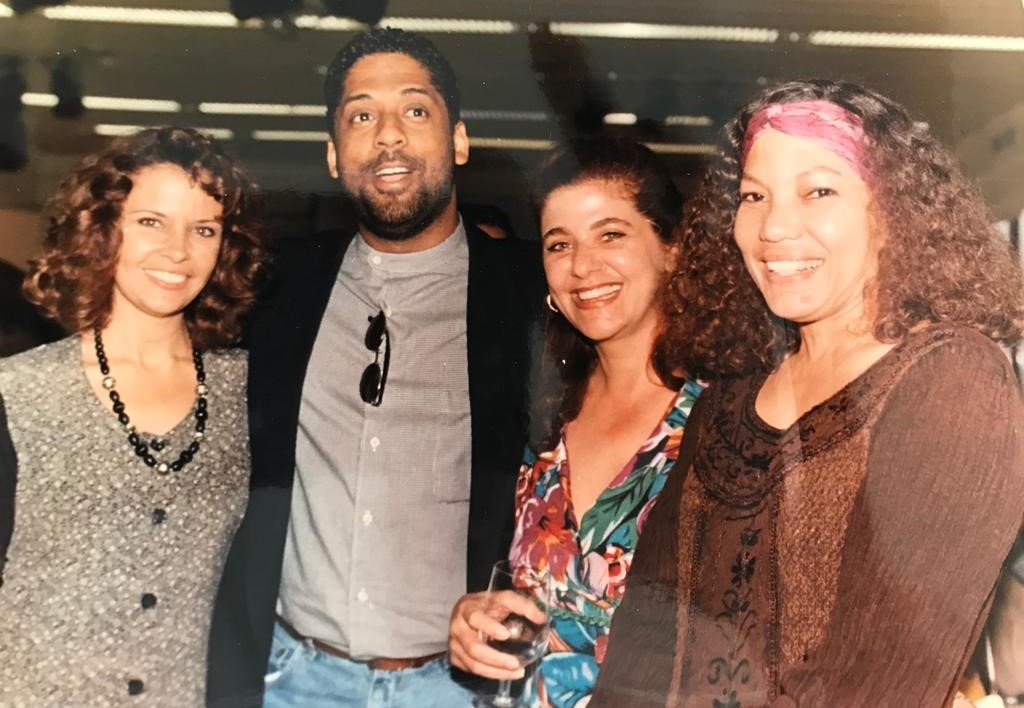
Bombs and threats
No, I did not receive a bomb threat: they planted a bomb in the club where Manolín performed the day before, the night before. A car exploded in Miami. I spent more than six months under protection from the federal authorities because I had a death threat. And they put a bomb in a car that they thought was mine. It wasn’t mine. At that time there was physical violence. The threats were constant. I have been on a flight from Miami to Havana that had to be turned back because they called threatening that there was a bomb on board the plane.
The insistence
I come from a family that does not give up in the face of challenges, in the face of obstacles; that turns adversities into opportunities; that has always believed in infinite possibilities. I think it’s in my genes. Do you know how many times I have thought about saying: “Well, I can live anywhere in the world, what am I doing in Cuba? What do I do when faced with absurd measures, with incomprehension?” It is absurd to think that I don’t have my disagreements, my differences with the Cuban State. I’ve always had them.
“I’m not a communist”
I’m not a communist, although I have never touched on the subject. I don’t share that ideology. For 45 years I have lived in what I consider one of the best countries in the world, to which I owe a lot. There have been many times when I have given up and said: it’s over. But I haven’t allowed myself to do this. It’s not in me. I can’t. I love this country unconditionally. I have learned to separate government, ideology, and country. This is my country, our country, where all Cubans were born. Imagine if I had left the United States during the terms of presidents whose ideologies and values I have not shared.
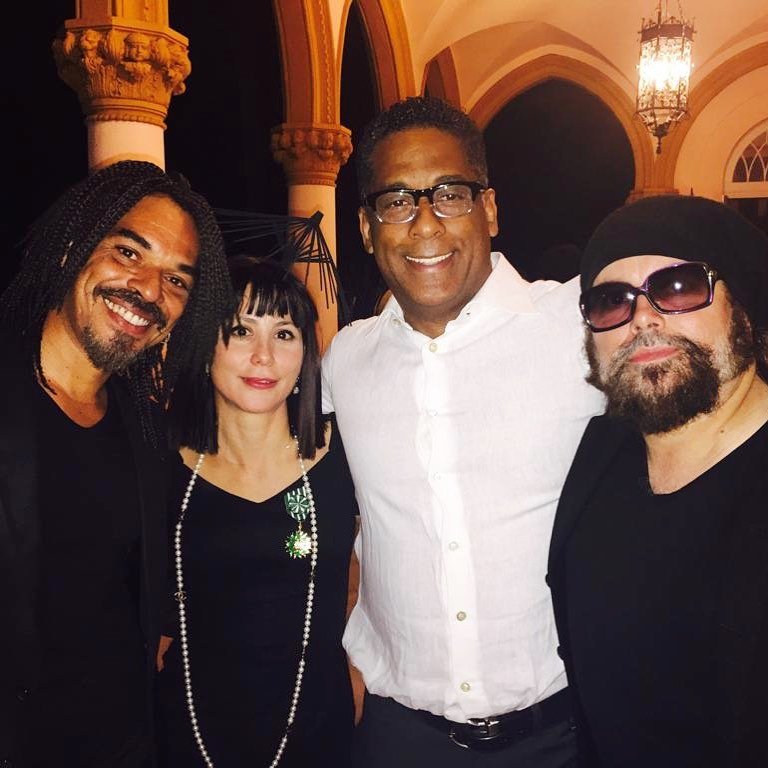
Without privileges in Cuba, and opening paths
Did you know that there are more than 100 requests from Cuban Americans to register their companies with the Chamber of Commerce of the Republic of Cuba? That there are more than 20 or 30 that already have projects as big or bigger than ours? And do you know how all that happened?
It happened because when we, Fuego Enterprises, decided to register the company with the Chamber of Commerce, we very humbly went there with our file, and they told us that we couldn’t. They didn’t give us any kind of explanation. “You cannot have a company registered in Cuba.” We insisted. They suggested that we find a way to have a non-Cuban person, residing abroad, be it a French or Italian person, to represent our company in Cuba, and thus they would agree to accept the application.
That offended me greatly. How am I going to need a foreigner to have a company in the country where I was born, where I grew up? Being Cuban. This angered me so much that it forced me to write a letter to the leadership of the country, directly to the president of the Republic of Cuba.
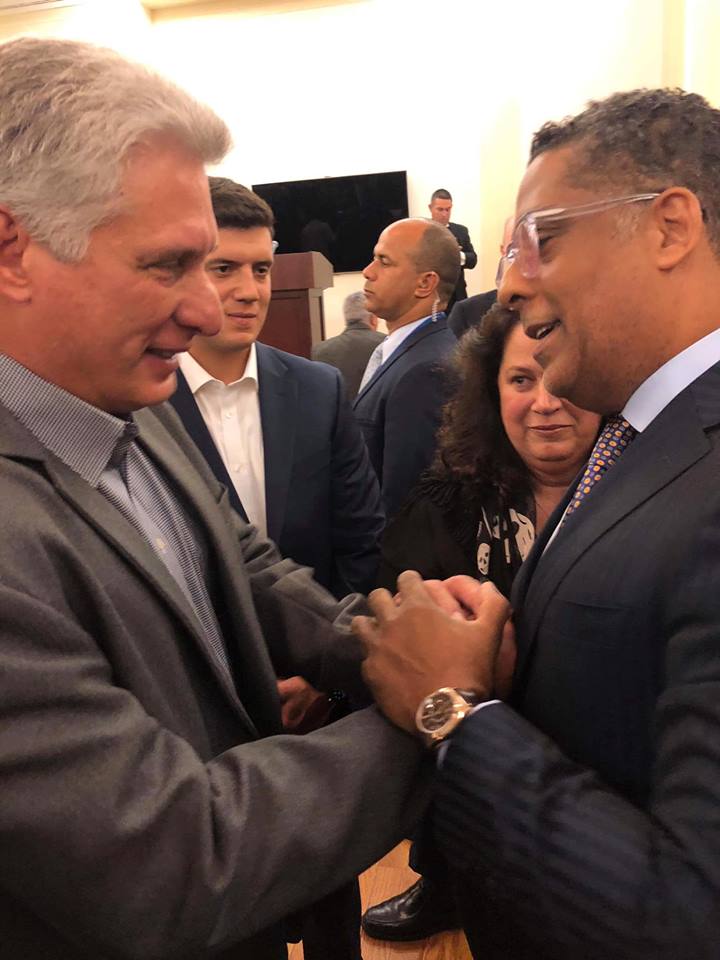
A right as a Cuban
In the letter I don’t speak about my right as a Cuban to open a branch before the Chamber of Commerce of the Republic of Cuba, I speak on behalf of all Cubans. And I speak of the need, what I repeat lately, to [understand] that Cuba’s greatest asset is its diaspora. And that diaspora should be taken advantage of. How was it possible that Cuban Americans had difficulties registering our company?
This resulted in our branch being approved a year and a half later. The number one. But they not only approved Hugo Cancio. Space was opened for everyone else. What you are seeing today. It did not open for Hugo Cancio. That is not like that. It took us a year and a half. But why? Because we insisted. Because we didn’t give up. Because the “no” was a “why not.” Because we questioned.
And above all because of the willingness of the Cuban State and Cuban officials to ask the same question. Because the rules don’t apply to Hugo.
No privileges in the United States
What privileges can I have before the United States government? What privileges could I have during the four years of the Donald Trump administration, which closed cruises, and rolled back some of the travel categories?
I went to Washington, I tried to meet with members of the administration. I met with many, I never got to the president; but members of the administration received me. Because? Because there are 25 years of work, of relations that I have with Cuba and the United States, that I have been fostering over the years and I have earned that space. But not because there is any privilege. And every space that I have earned — because no one has given me absolutely anything — is a space that is earned for all Cubans, not just for me.
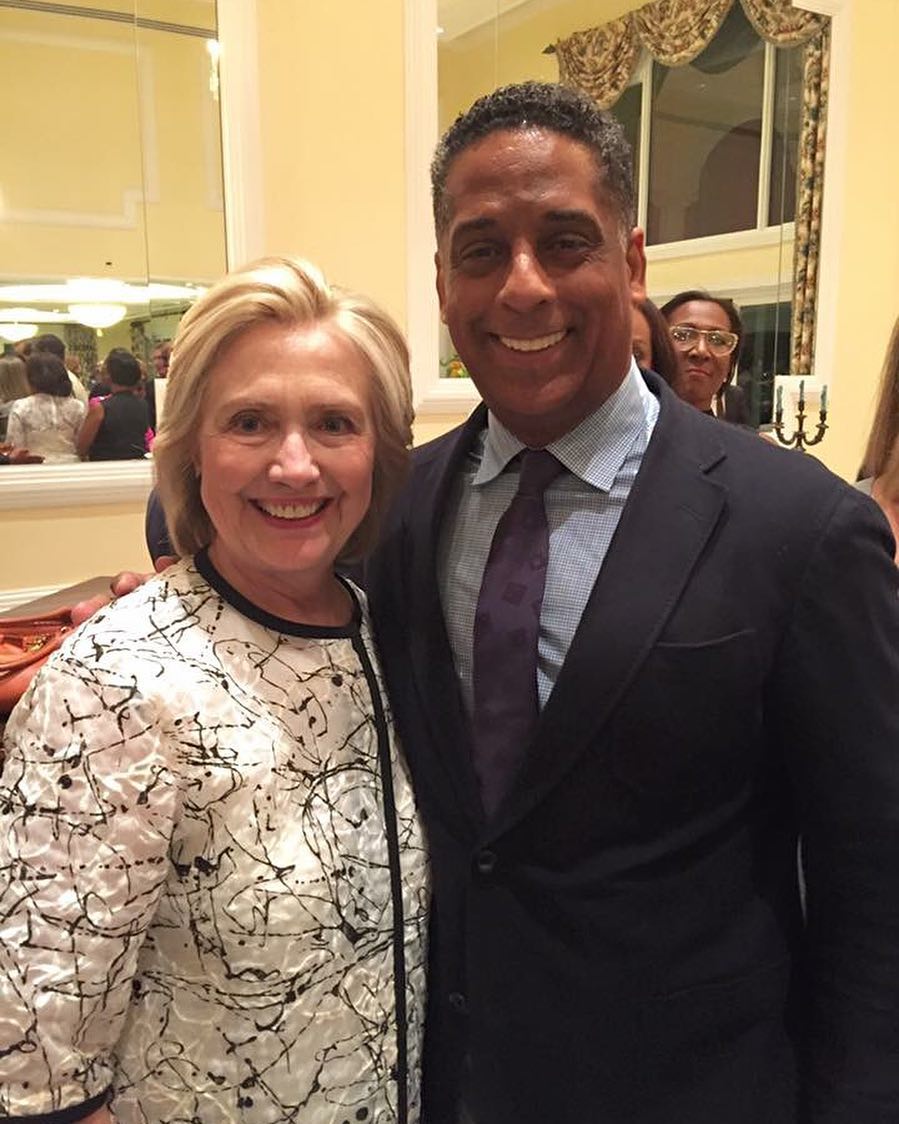
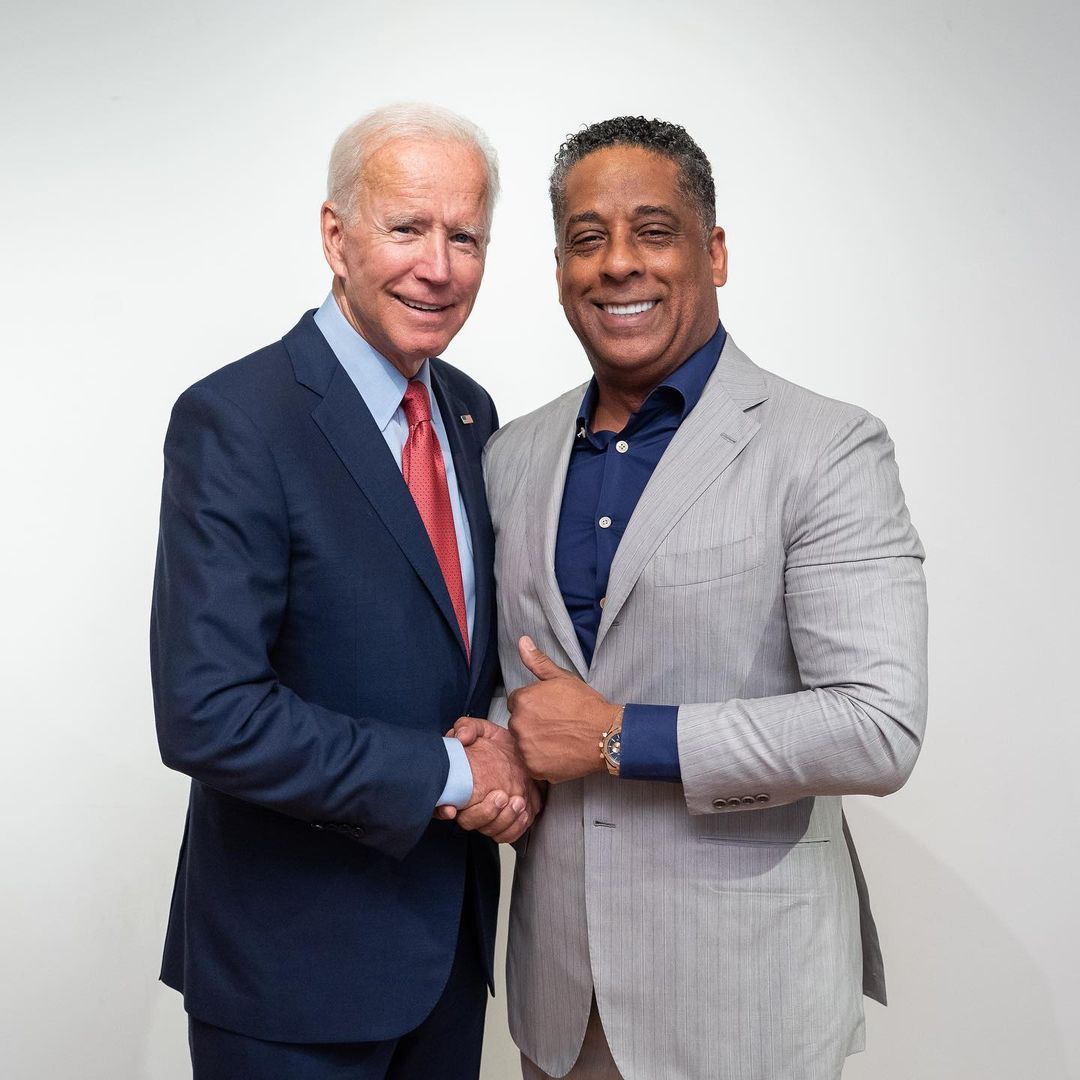
Katapulk, a marketplace
How many online stores exist today? There is talk of Katapulk and Katapulk, but there is a hemorrhage of online stores and the vast majority are from Cubans living abroad.
Before Katapulk there were already several platforms that have been working for years. Katapulk arrived during COVID-19 and grew extremely quickly. When I was given the opportunity to create Katapulk, we set logical conditions: that the entire project, from its beginning to the delivery, the last mile, would be managed by us, with the least intervention from the Cuban State.
The drivers are ours, we rent the warehouses, but the staff inside is ours. That was one of my conditions. I want to present this project, but if they approve it, I want it to be totally ours, with the least intervention from the Cuban State, where the private sector participates, where the largest number of products that we have for sale within our platform come from national producers, from self-employed workers, from the sacrifice that ordinary Cubans are making to get ahead. Katapulk was always about that: giving opportunities to self-employed workers, producers, farmers, artists, who could have a way, a mechanism, to expose and market their talents.
The only stores within Katapulk that are ours are called Mercado Único and Reforma. The rest of the stores that are within the Katapulk ecosystem are self-employed workers, MSMEs, farmers, people within Cuba, to whom we have given the space to sell their products. They choose the price. We try to regulate them a little, so that they don’t go over the top… Sometimes these prices are abusive and we monitor them. But if any of the people who are watching or reading this interview go to Amazon, they can see the same product with different price ranges. Because they are different suppliers. Ah, you look for the cheapest one.
Supporting the private sector
We are a marketplace with a fairly broad ecosystem, ranging from passport renewals, mobile phone recharges, and soon, in a partnership we made with one of the largest companies in the world, we entered the world of family remittances.
And obviously, as we are supporting the private sector, which is the majority of the stores we have, prices may vary. But if you go into the store called Mercado Único, inside Katapulk, you will see that the prices are cheaper than in many you find in the stores in the United States, above all, in my community.
The prices are cheaper because we have dedicated ourselves precisely to making the prices affordable to the largest number of Cubans living abroad who want and need to help their families.
Now many neighborhood food stores and so-called bodegones have appeared, which have the same amount of food that you can find in any store in the United States.
Buying from Cuba
Katapulk is also going to focus on this, on the possibility that people from Cuba can also purchase its products. Now, for example, anyone who has access to MLC [freely convertible currency], that virtual currency that exists, or who receives money from abroad through a family remittance, or whatever, and has their Transfermóvil app, can now buy at Katapulk. Most don’t know it, but they can now buy at Katapulk.
Where we want to get to — which we are very close to — is that people who don’t have MLC can buy in Katapulk in national currency. But can you imagine the sacrifice, the strategy that this entails if we start selling in national currency? How do we replenish our warehouses if the national currency (the word says it: national) is of no use outside the Cuban market?
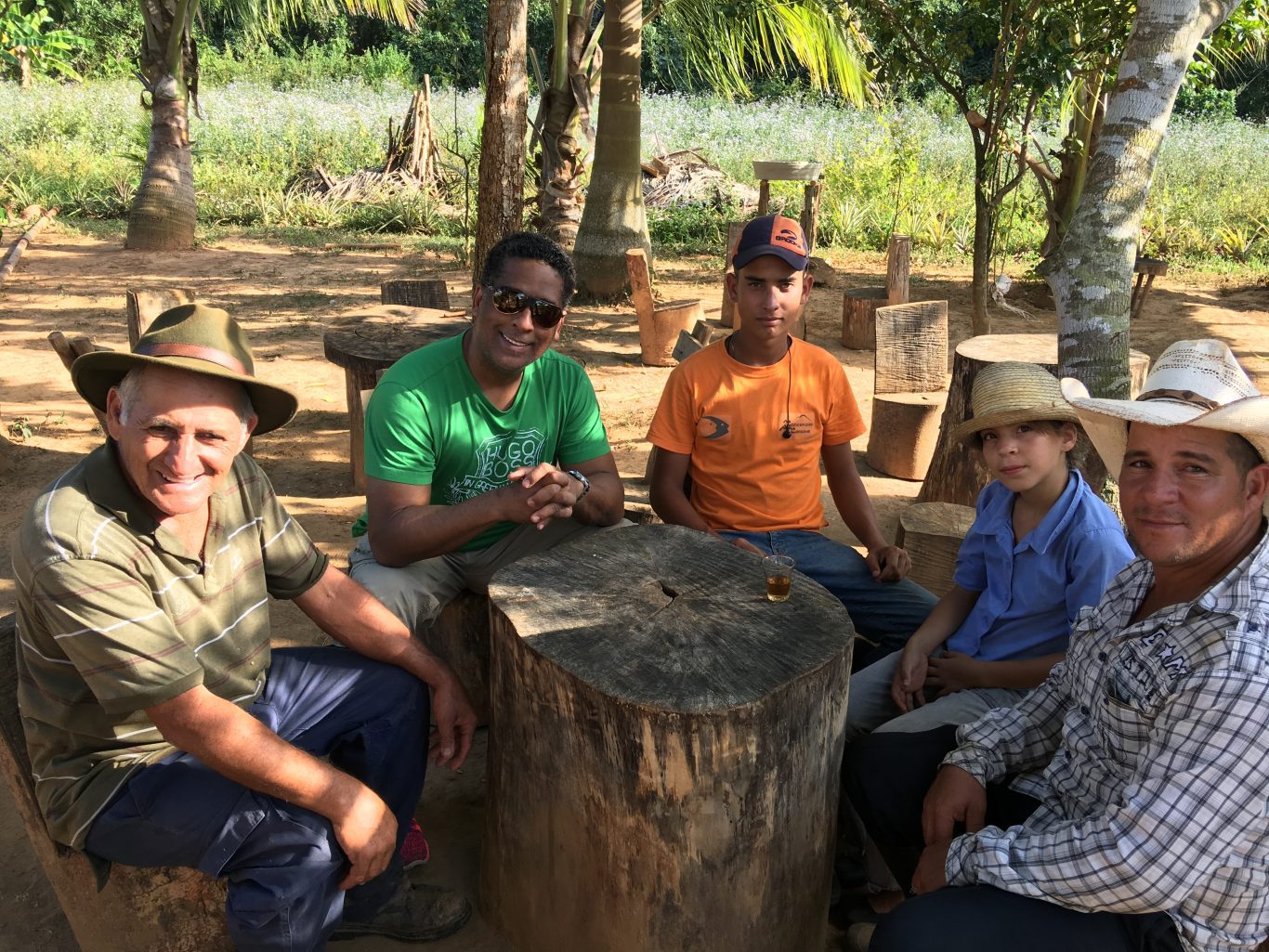
Katapulk is a project of progress
Unlike people who are bringing containers to sell and sell them in national currency or sell them in dollars, we have an infrastructure set up in the country. As we grow, we have expenses in the country.
All within the framework of the law, respecting the laws of the United States, which allow us to have the presence that we have in this food sector. Within that sector where we are authorized, we are expanding, we are diversifying and obviously, we are beginning to have expenses in national currency. It is the opportunity we were waiting for to be able to make offers within our platform in national currency and for the greatest number of Cubans to have access.
Katapulk is a project of progress, it is not an invention of the moment.
We are focused on contributing and being part of this economic culture within the framework of United States law and within the framework of the leadership of the Cuban State.
Promoting national production
How do we empower those self-employed workers, those farmers, those small and medium-sized farmers, so that they can continue increasing their production levels?
At this time, United States laws don’t allow us to invest in these types of projects. You would have to request a specific license. We would love to, we are heading in that direction, to empower these entrepreneurs so that they can increase their production capacity and continue expanding.
Right now the opportunity we are giving them is that they can sell their products on our platform, where we pay them in accounts abroad, so that they have access to hard currency. That is, the products that they sell in the national territory, in the bodegones, or those they sell to the State, they are selling them in national currency. With that national currency they cannot buy technology, raw materials, they cannot have access to materials they need to continue growing. We, indirectly, without making a direct investment in them, only giving them the opportunities to sell their products within the ecosystem of our platform, are generating for them foreign currency, hard currency, with which they can go out and buy their products abroad. We are contributing to the growth of the private sector without having to make a direct investment with them now. But that’s what we want to get to. We’re going to get there.
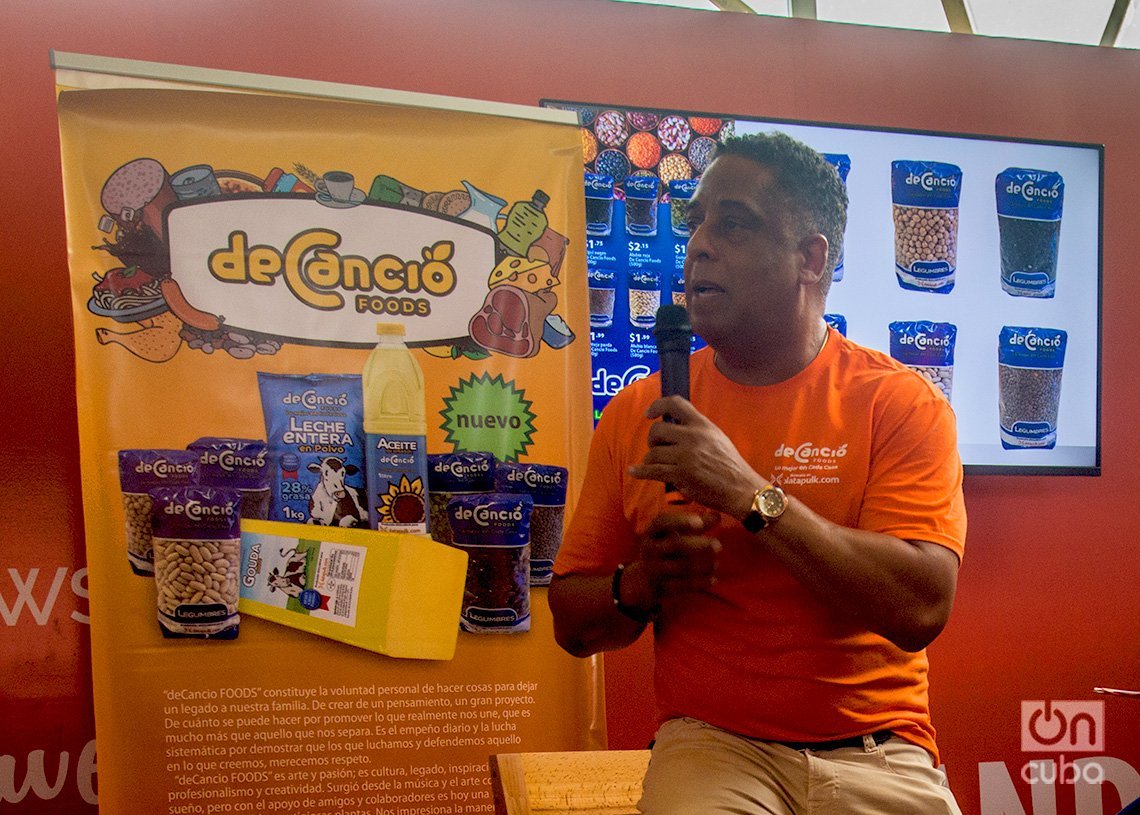
Premiere: deCancio Foods
Did you know that there is not a single executive in my company, both in the United States and in Cuba, who agreed with that decision? My executives in Miami said that no one was going to buy a product with the deCancio brand. And I have always said that those people who oppose what I have been doing for many years are a group, they don’t represent the entirety of my community, the community where I live.
We Cubans are very sensitive. But it was not an act of vanity. It was more of an act of necessity. And I could even say, desperation.
First, I did it to honor my father and our family name.
I’m the only male child. I have three sisters, three daughters. I’m already in my fifties. I don’t know if I dare have another child, just to hope for a male child who can perpetuate the family name.
A brand that’s ours
Secondly, we have brought important brands from the United States to Cuba. On some occasions they have been given to us on an exclusive basis. We have promoted them.
We have had to first convince the owners of the United States brands to enter the Cuban market. And, of course, that is an odyssey. Later we had to convince the Cuban authorities to allow some X brand because the owners of the brands supported Donald Trump and, at some point, have made negative comments about the Cuban government. After we achieved that, and we met the expectations or contractual demands, the brands have come to Cuba, they have fallen in love with Cuba, they have seen the sector growing and the economic opening and they have said: “Cancio, thank you very much, but now we are going to set out on our own.” And I said: “It’s going to continue happening to us with other brands. If we don’t control a brand and we don’t have our own brand, we will not be able to do it.”
We decided we had to make a brand. Where was the problem? In the name. After we launched the brand, I had a reception with a friend, someone I admire a lot, and when I walk in, he gives me a hug and says, So “deCancio,” right?! If I had launched a brand with the name “Inki Inki,” or whatever, it would have cost us, as a company, five years to establish the brand and 3 million dollars to position it.
With “deCancio,” for whatever reasons, we knew — or I knew — that it was going to cause controversy. But it’s like that exercise, jiu-jitsu, that sometimes you take the negative energies of others or the energies of the opponent’s attack and use them in your favor.
I never do anything with the intention of provoking controversy, but when that controversy is promoted and cultivated, we know how to maneuver to take advantage of that and turn that adversity into an opportunity.
deCancio is not Katapulk’s white label
It is an international food brand. I believe that very soon, by mid next year, you will see our oils and our cheeses in European supermarkets and possibly in the United States. I wanted to create a brand that was ours. If you look closely, if you go to a supermarket in Cuba, or if you go to the online sales platforms, there are many top-level brands, almost none made in Cuba, with the sense of belonging, of Cubanness, of what we represent as Cubans.
Many of the brands that are sold are — I’m not going to mention names — Spanish, North American, Puerto Rican, and we don’t sell national products produced in Cuba.
deCancio is a brand that, even though it is manufactured abroad, is made by a Cuban, thinking about the Cuban market, for Cubans, I call it “a brand that’s ours,” I believe it is — I’m not going to say that it’s the first, there will be others, I don’t know. It is also made with premium quality and good prices in mind. That is, it was done with that intention, to reach as many Cubans as possible.
And very soon you will see it in national stores in Cuba. Because that is the intention. It was not made to be sold solely and exclusively through our marketplace.
National producers are going to make their products with the deCancio brand. With the double intention of meeting the needs of the national market, exporting them to the United States and working for other parts of the world.
There is a great deal of talent here in Cuba. There are many people who want to work. Beautiful, noble people, excited about these opportunities. Given the tools needed to satisfy the basic needs they have, it would be very interesting to see how far they can go.
Moderation and caution
We human beings tend to fluctuate between opposite poles, between extremes, sometimes without measuring the consequences. Look at the process in the former Soviet Union, how the country went towards big business, and big companies fell into the hands of oligarchs and there were shoot outs in the streets of Moscow. I have always studied these processes in China, in Vietnam, and I have always feared that, based on the economic need that the country is going through, that we Cubans and our country are going through, after some 62 years of extremely strong and forceful economic measures — which do exist.… The embargo is as real as our palm trees; after having gone through two years of COVID, the need leads to an opening so sudden, so fast, that it forces us, and I say forces us because I put on the Cuban hat, that forces the Cuban authorities to depart from a communist society, socialist, with an inefficient economic system, towards savage capitalism. That has always been my concern.
I was born in 1964, I did not see capitalism in Cuba, but we all know that the large companies and the large economic interests of that time were in the hands of U.S. companies. I wouldn’t like that to happen again. I would like that in Cuba, whoever is president, with whatever system of government that exists, the rulers are capable and intelligent enough to not let that happen. That they not allow our economy, our well-being, the future of our people and our young people to fall into the hands of foreign interests.
Among Cubans
When they told me a few years ago that approval was already on the way so that Cubans living abroad would have the opportunity to come to Cuba and participate in the economy, sitting right here in my home I told them: “That’s good, but are you really convinced of what you are going to do? Because you have to be really convinced because don’t think that we are going to come to Cuba with a check, with an idea and a suitcase full of money to invest. With that check and that suitcase come our political criteria, come our political differences.
Many of us don’t share the same values and the same ideology. They have to be willing to accept all of that, I told them. If not, don’t open. Because if you think that you are going to open to give the opportunity only to those who agree with you, don’t open because it will not be like that.
I myself do not share the same ideology. I would like to see a Cuba very different from this Cuba that exists. The same things bother me and hurt me that hurt the rest of the Cuban community where I live. The thing is that my way of contributing, of assisting to ensure that these things don’t happen, is not by vociferating on social media. Sometimes friends tell me: “because look at what happened in Cuba and you don’t come out publicly to comment on it.” And I tell them: “Hey, I didn’t find out that you were in a divorce process with your wife. Don’t you use the social media to vociferate about all your domestic problems?”
No, because they are my issues, but the problems that I have in my country must be resolved between Cubans. My contribution, my grain of sand is every time I have the opportunity to express my discontent, my feelings, my frustrations to the people who really have the ability to make those decisions and change things. Posting them on social media doesn’t move the needle.
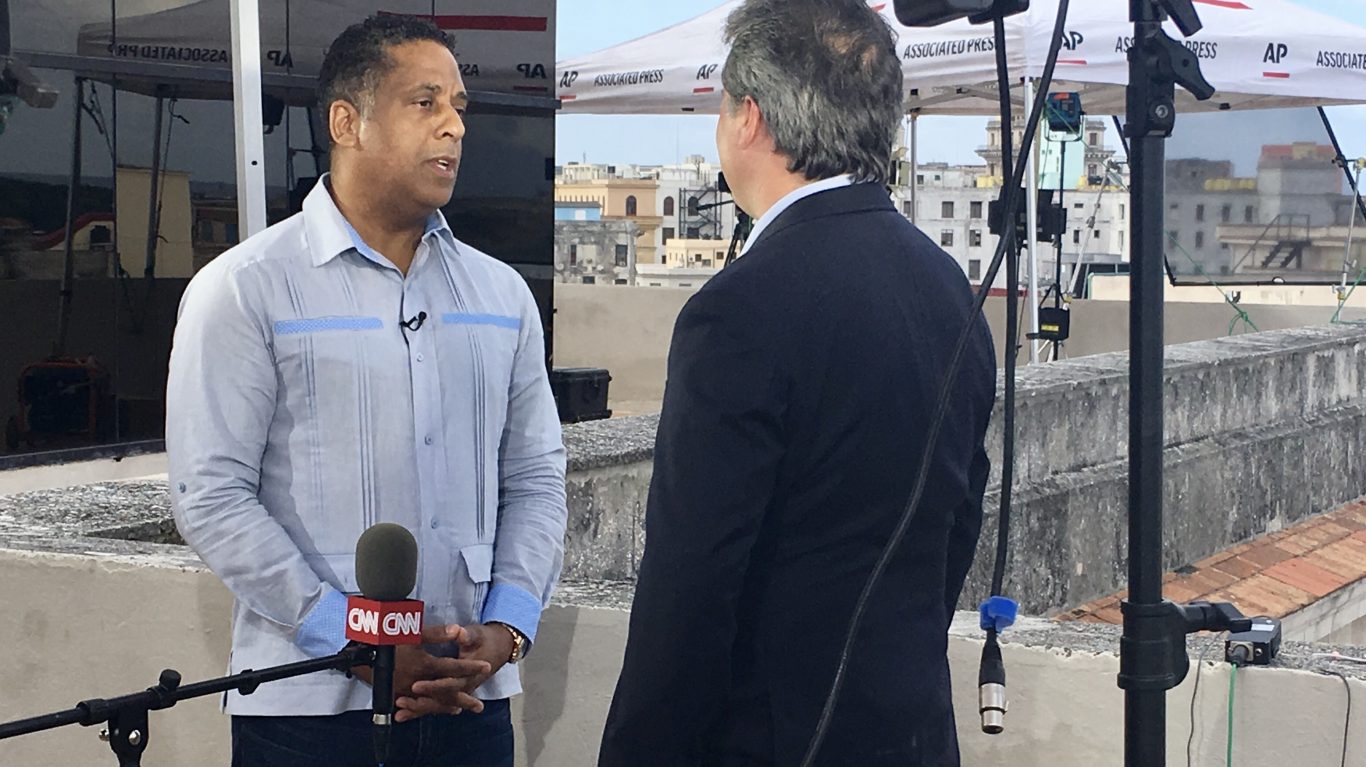
The blockade does exist
“The embargo does not exist. In Cuba there is Coca-Cola, in Cuba there is Kellogg’s, in Cuba there is Haagen-Dazs,” some say. Look at the prices those products have in Cuba. They don’t have a presence in Cuba. Coca-Cola arrives through an intermediary, who buys it in another country and sells it to Cuba. In Cuba the price for a Coca-Cola is extraordinary. None of these large companies have a presence in Cuba, nor will they have one. So, yes, there are those products, but through the maneuver of intermediaries, of brokers around the world who import those products to Cuba.
I’m not going to give a dissertation about the blockade or how severe the economic sanctions imposed by my adopted country on my native country, which is everyone’s country, are. They are visible, you see it in the streets of Havana; they are palpable.
When you see President Biden or Secretary Blinken say that they have imposed sanctions on Russia, that they are going to make Russia pay the price for having invaded a sovereign country like Ukraine — an invasion with which I totally disagree — when you hear that they have imposed on Russia the most severe sanctions aimed at suffocating, strangling the Russian economy, those sanctions that President Biden and Secretary of State Blinken refer to don’t even represent 30% of the sanctions imposed by the U.S. government on Cuba.
Did you know that the most severe sanction that some politicians in the United States want to impose on Russia, which would be the final blow, is to remove access to the Swift Code, which in the United States we call the Routing Number? To make internal transfers within the United States we use the Routing Number. When we are going to make transfers to other countries, which are necessary to maintain a business, it is called the Swift Code.
And the Biden administration has not dared to take the Swift Code away from Russia, because it would be the final blow, the end. Cuba has never had the Swift Code. It’s never had it. Cuba has never been able to carry out banking transactions in dollars, which is the main currency that predominates in the world. So what’s this about there not being an embargo?
A totally incoherent policy
People say, “What embargo is there?” Our company has requested nine licenses from the United States authorities to do business in Cuba. And we move within the framework of those specific licenses and general licenses.
Did most of the people who read us know that if we are going to import toothbrushes to Cuba, the toothbrushes have to have a certain number of bristles because it has to be a necessity product? If it has many more bristles and that little button that is electric, it is a luxury brush, and it cannot be imported. I mean, they are absurd things.
Yes, the embargo exists. Yes, it exists. Furthermore, in my personal opinion, lifting the embargo would have such a shocking effect on our country, not only economically, but even politically. It has been a totally incoherent, non-productive, obsolete, abusive policy. The most powerful country in the world wanting to impose its will. And, look, I learned a long time ago to understand that it is not the country.
I have spent too much time in Washington, I have spoken with politicians of both parties about how unfair these measures are and everyone understands it. Except political members, members of Congress, representatives in our community. That’s where the quid of the question lies. This incoherent policy is promoted in my community. But that’s going to change.
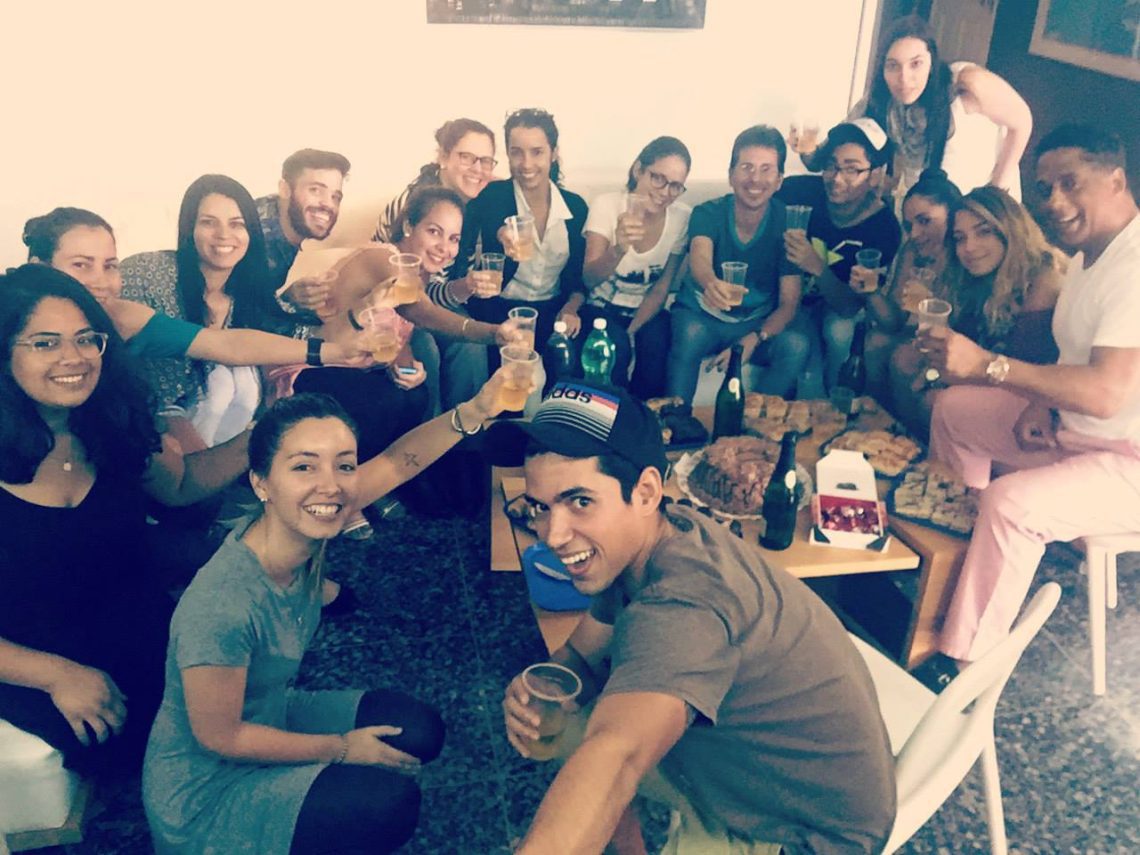
It’s the economy, stupid
To the extent that Cuba reconciles its differences with its diaspora, with Cubans residing abroad, especially the Cuban-American community; to the extent that more opportunities are offered to Cubans so that they can be part of this process of economic opening; that Cuba is more inclusive, that our rights are recognized within Cuba, our community starts changing.
Most of my friends who are radical far-right, Trumpists, are already looking for how to bring five containers of chicken and four of rice to Cuba. And I tell them: “But what happened to…?” It’s the economy, stupid. Most of those Cubans are already thinking about how to do it. What happens is that this does not appear on social media, nor do influencers appear or spread it.
Changing Washington
As Cuba recognizes our community as an important part of Cuban society, and returns part of those rights to us and makes us participants, our community changes.
And we are the ones who change Washington. What argument are they going to have? As economic opportunities open up in Cuba and as more Cubans residing in my community and in the United States become part of this process of economic opening, the discourse of people who oppose a rapprochement with Cuba will be more focused on human rights. Notice that they can no longer argue that MSMEs belong to the children of generals, cousins of I don’t know who.
A few weeks ago 70 MSMEs went to the United States. None were linked to any head of the Cuban government or whatever. The majority of the people who sell products in Katapulk are small farmers… from Ciego de Ávila, who have struggled a lifetime to get ahead, who had land in their parents’ usufruct and have spent a lifetime working in the fields and have come out forward. And no one has given them anything. They don’t have the advantages that others may have. And they have moved forward.
What is the discourse going to be when the majority of Cubans in my community already have an economic link with their country? What is going to be the discourse of those politicians? What will be the future of those influencers who, for whatever reasons, spend their time spreading hatred, resentment, separatism and divisionism? What is the future going to be for them and for their own contributors who contribute with their commercials on the platform?
Defending the oppressed by exercising oppression
Not everyone agrees that Cubans who live abroad return and be part of the Cuban nation. There is internal opposition to that. I have felt it. I hadn’t given an interview in a while. And precisely a few days ago I started writing a text. If you allow me, I’m going to read you something.
But first I want to say that I would be unable to stop the desire of any of those influencers to express themselves freely. They are within their rights. And I suppose some of them has a reason for doing so. They do it with good intentions. There are others who don’t. Some with hidden reasons or with the objective of billing. Or to keep us divided.
“Harassment and persecution, the use of a position of power to lie, slander, try to destroy another person for the simple fact of disagreeing with them, promoting and cultivating hatred, divisionism, resentment, is not a healthy exercise. Furthermore, it is unproductive. Bad actions are not combated with bad actions. Or to capitalize, bill, under the pretext that they defend the oppressed people of Cuba. This work in itself is an obvious contradiction of that pluralistic, inclusive, democratic Cuba, which they themselves demand from the Cuban government. And that many of us want to see. What honorable result has it given throughout history to defend the oppressed by exercising oppression?”
An exercise in imagination
We are going to do an exercise of imagination: that they achieve what they intend, with their message of hate, resentment and so on, which is to overthrow the Cuban government, that it happens overnight. Imagine one of them, any of them, being the new leader of the Republic of Cuba. Is that the Cuba we want to see? Is that the Cuba that I want to live in, that I want my daughters to visit? If in that position of power in which they find themselves, in the country of democracy, they have not learned the true meaning of democracy, pluralism, can you imagine them in a much broader position of power, where they have judicial power and the police power under their command…? What would happen to those, to all of us, who in some way disagree and want to unite, want to bind, want to reconcile our differences?
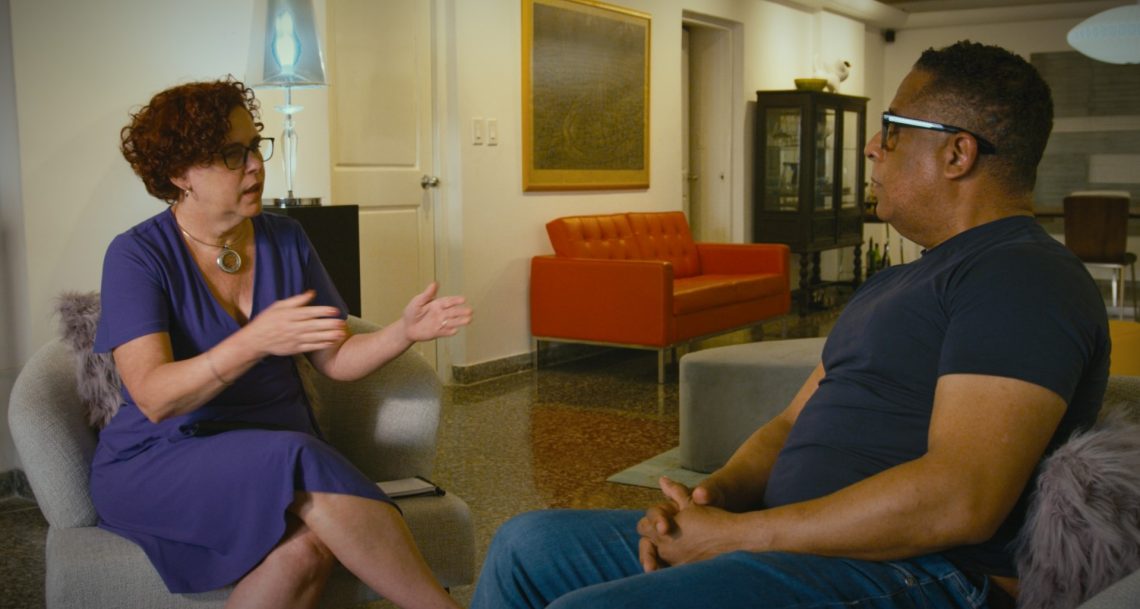
Not an activist, a businessman
I’m not an activist. I have expressed my discontent, my frustrations, but I have always made it clear that I’m incapable of lifting a finger against my country.
A finger that I raise against my country would be against my nephews, my sisters, my uncles, my friends, the people who work with me, those people who walk the streets who are not to blame for the inefficiency of the Cuban State, of the mistakes that have been made here and are less to blame are we who live over there, from conformity or, let’s say, from our comfort zone, drinking a Coca-Cola on a yacht or eating a steak at the Versailles, do we want to do everything possible to make their life miserable. It is not only against the Cuban State.
The idea is to strangle the Cuban economy so that the people take to the streets and overthrow the Cuban government. I have never advocated an overthrow of the Cuban State. I’m a businessman. Just as Elon Musk has not done it in China, nor has any of the U.S. companies that have a presence in China that don’t share its ideology, don’t share the culture, don’t share its philosophy of life, don’t share absolutely anything and, yet, have present interests in China. I share many things [with Cuba]. First, I’m 100% Cuban. I have a love for this country that I sometimes don’t understand why it is so great if I have lived most of the time in the United States. The culture, the idiosyncrasy, is as much mine as everyone else’s.
I always try to put myself above differences, religions, political problems, ideologies. I can’t get into a fight with a family member or break up with a friend simply because we think differently. Most of my friends are Trumpists; I’m not.… We are going to die. What’s the point? Most human beings learn to live when it’s our time to die.
I don’t need an influencer
The time I have left I want to spend with my family, with my friends, and contributing from my smallness with what I can. But I can’t dedicate myself to political activism. It’s not my business, it’s not my thing, it doesn’t suit me.
Nor have I seen any of these new leaders, influencers, have a coherent, acceptable, feasible, tangible political agenda, that you can say: “You know what? There I can, perhaps, support, even if I get into trouble in Cuba.” I haven’t seen it. Everything is hatred, everything is resentment, everything is insults, falsehoods and lies…. We can’t, I don’t want to live like this. I haven’t watched local television in Miami for more than 15 years, precisely for that reason. Nor do I watch Cuban television. I don’t read Gramma, Juventud Rebelde, or El Herald. I detoxify myself from the Cuba problem because I don’t need an influencer or any media outlet to tell me the interpretation of what is happening in Cuba when I come here often and see it, feel it, touch it, breathe it. I believe in my own conclusions.
But it hurts me enormously that there are thousands of people, hundreds of people, who take up their valuable time after work, running in traffic in Miami and sit to watch on the Internet one of these influencers.
Respecting your compatriot
In Cuba we have to learn to coexist, accepting that we are not equal, that we think differently and that we want to move forward in a different way. We cannot allow an ideology to be imposed on us. You have to learn to respect your compatriot. That is the Cuba that I would like to see and that is why I think that this is Cuba’s best asset and we have not known how to exploit it. I’m going to continue advocating for that. I know that many say that Hugo Cancio wants to be the only one. It is not true, I have been saying it for a long time and I continue to advocate for it so that there are a thousand Hugo Cancios and like me, that there are 2,000 more and that, above all, we don’t forget about the unprotected, those who don’t have a cousin, a brother or nephew residing abroad.
To the new entrepreneurs…
Don’t give up and above all, don’t leave the country. I understand the desperation, but it is the time when I would stay in my country. It is the time to contribute to the evolution and transformation of the economy of my country because if I’m prosperous in the business I have, I create more jobs, I create factories, I can help the private sector to integrate people who migrate from the state sector to the private sector. Patience, perseverance, persistence.
I always say that the possibilities are endless. Did you know that there are Cuban companies here, and Cuban nationals who have become very rich by working hard, working hard, not by inventing? And in the process of creating that personal wealth they are spreading that benefit to others. Any businessman, whoever he is, does not think that success comes overnight. The difference between those who achieve some things and those who don’t is that some withdraw and back down, they allow themselves to be defeated, and others continue.… Every day I get up in the morning and every day something happens that I have to take the best out of me to get ahead and not give up. And say: “No, no, no; this is not the end of the world, we are going to solve this this way.” That is my nature and that is the nature of turning adversity into an opportunity that is not a business, that is dedicated, I don’t know, to writing a good book, to reading a good book. The nature of an entrepreneur is persistence, perseverance, not giving up and becoming a magician, turning adversities into opportunities, which happens to us all. What happens is that some drown in a glass of water and others say: “No, no, no, no, I’ll devour the world and they can’t stop me.”

